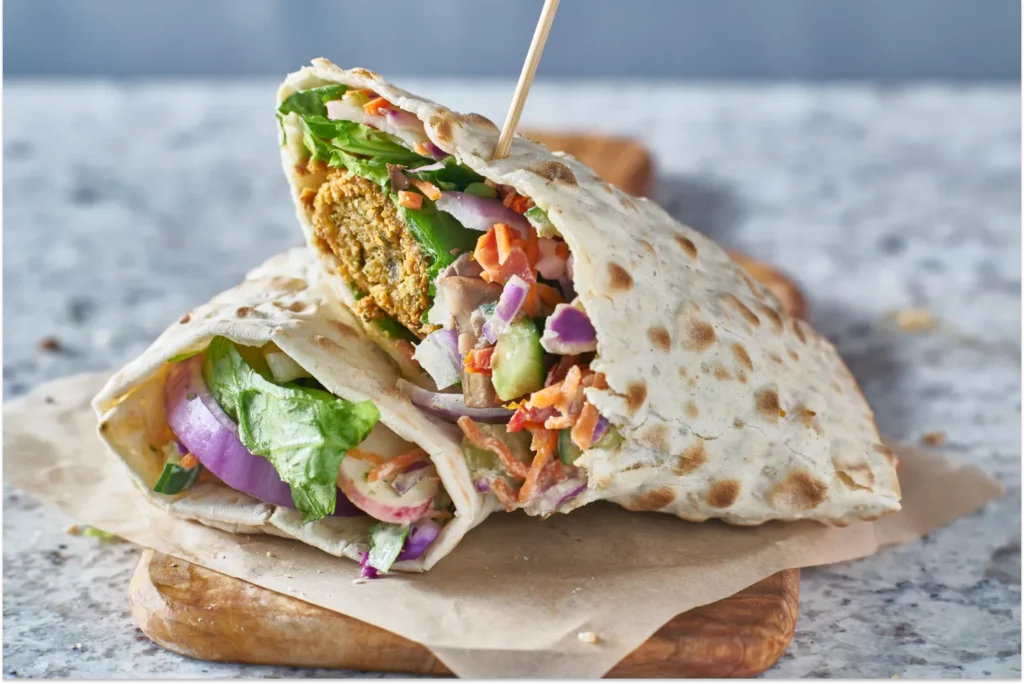The Mediterranean, a region brimming with rich culinary traditions, brings us the delightful Mediterranean wrap — a wholesome embodiment of the healthful Mediterraneandiet. These wraps are bursting with flavors and are incredibly versatile.
From veggie wrap options to protein-packed chicken wraps, they serve as a delightful main course or an easy lunch. Besides being flavorful and delicious, understanding the nutritional profile of these wraps is crucial. They offer a balanced nutrient content packed with essential vitamins and nutrients.
That said, being mindful of serving size is important, ensuring you derive all the wellness benefits they promise.
How To Make Mediterranean Wraps: A Step-by-Step Guide
The secret to any great dish lies in its preparation. For Mediterranean wraps, this is no exception. You need a blend of fresh veggies, mouthwatering dressings, and tender proteins to craft the perfect wrap. But before diving into the ingredients and assembly, let’s discuss the significance of prep time and total time.
Planning and preparation are paramount for any culinary endeavor. As a general guideline, most Mediterranean wraps require about 15 minutes of prep time, which can vary based on specific ingredients or personal preferences.
Remember, good food isn’t always about how long you cook but how well you prepare. An optimal prep time allows for the flavors of the artichoke hearts, feta, onions, protein, and zucchini to meld seamlessly with rich hummus and tangy dressing.
The total time considers both preparation and assembly. For a Mediterranean wrap, the total time typically doesn’t exceed 25 minutes, making it an ideal dish for those seeking a quick yet nutritious main course.
When considering gluten-free or whole wheattortilla options, it’s essential to account for any additional prep time these might require, especially if making them from scratch. The same goes for any toppings like tahini or hummus; freshly made dressings can elevate the wrap’s taste but might add a few minutes to your total preparation time.
What Ingredients Do You Need for Authentic Mediterranean Wraps?
Creating an authentic Mediterranean wrap begins with selecting the freshest and most flavorful ingredients. Start with a tortilla as your base. Consider gluten-free or whole wheat variations to cater to your dietary needs.
You’ll also need creamy hummus, the heart of many Mediterranean dishes. This can be made from scratch or store-bought. Mediterranean wraps also feature veggies such as juicy artichoke hearts, zesty red onion, chopped romaine, baby arugula, and succulent zucchini.
Opt for proteins that complement the veggies, such as chicken kabob or a convenient rotisserie chicken from your local deli. No wrap is complete without the tang of feta cheese and the rich taste of kalamata or black olives.
You’ll finish your wrap with your dressing of choice. Tahini offers a nutty hint, olive oil lends a smooth finish, and red wine vinegar gives a slight tang.
Preparing the Wrap
The assembly is where the magic happens in a Mediterranean Wrap. Start by warming your tortilla or pita; this makes it pliable and enhances its flavor. Next, slather a generous amount of hummus — this acts as a delicious glue holding all the ingredients together.
Begin layering with your veggies, ensuring a mix of textures and flavors. Place proteins evenly to ensure each bite is consistent. Sprinkle feta cheese for a salty kick, and scatter olives for a briny punch.
Drizzle your chosen dressings over the top. When wrapping, fold in the sides first, bring the bottom up to the center of the tortilla, then roll the tortilla, making sure to tuck as you roll. This technique helps contain the ingredients and prevents any flavorful spills.
How To Serve Mediterranean Wraps
Serving a Mediterranean wrap is an art in itself. Unlike its cousin, the burrito, it’s typically lighter and focuses on fresh, vibrant ingredients. To serve, slice your wrap diagonally in the middle, showcasing the colorful interior.
This wrap will elevate any lunch paired with a side of lemon juice drizzled salad or crunchy romaine leaves. If you’re enjoying it on the go, wrap it in parchment paper, which helps hold it together and provides a drip-free experience. Lastly, don’t forget a refreshing beverage, perhaps a glass of iced mint tea or a light wine, to capture the true essence of a Mediterranean meal.
Are Mediterranean Wraps Good for You?
The appeal of Mediterranean wraps extends beyond their tantalizing flavors; they’re nutritionally packed powerhouses. A typical wrap encompasses a balanced blend of macronutrients, providing essential fats, vital carbohydrates, minimal cholesterol, and a hearty dose of dietary fiber.
Let’s dive deeper into the ingredients:
Hummus, made primarily from chickpeas, is a great protein source. Feta cheese sprinkled in the wrap delivers a substantial amount of calcium for bone health.
Regarding vitamins, red onions and peppers are nature’s gifts, rich in vitamin C, which is essential for immune function and skin health. Olives, whether kalamata or black, are full of healthy fats, particularly monounsaturated fats known to support heart health.
Incorporating Mediterranean wraps into your meal plan can be a strategic move. They not only align with daily value requirements and ensure you remain full and energized. Embracing these wraps is about tasting the Mediterranean and benefiting from its time-tested nutritional wisdom.
Tips and Tricks for Making the Best Authentic Mediterranean Wraps
Crafting the perfect Mediterranean wrap is an art, but with a few tips and tricks up your sleeve, you can master this delightful main course. First, consider variations to keep things exciting.
You can swap the traditional hummus spread with a spicy hummus wrap or lean into veggies with a refreshing veggie wrap. For a protein-packed twist, a Mediterranean chicken wrap with zesty herbs can be a game-changer.
When selecting ingredients, romaine can be a crisp addition, offering a pleasant crunch with each bite. While kalamata olives provide a distinct flavor, black olives can be a milder alternative.
Always prioritize fresh ingredients, and remember that homemade wraps often pack more flavor and fewer preservatives. However, don’t shy away from deli products if you’re short on time.
Storage is crucial when it comes to Mediterranean wraps. For an easy lunch, prepare your wraps the night before and store them in the fridge wrapped in parchment or a clean cloth, ensuring they remain moist but not soggy. Compared to restaurant-bought wraps, making them at home allows for customization, ensuring every bite aligns with your palate and nutritional needs.
Our Recipe
Here’s a quick recap of our recipe:
| AMOUNT | INGREDIENTS | NOTES |
| 1 | Tortilla | Tortilla can be gluten-free, whole wheat or flavored |
| 1/2 cup | Chopped Romaine & baby arugula | Can be substituted with a packaged spring mix or your favorite type of lettuce |
| 1 – 2 oz. | Hummus | Can be made from scratch or store-bought |
| ¼ cup | Red Onion | Diced |
| 1 oz. | Feta Cheese | Crumbled |
| 1 oz. | Olives | Black or Kalamata |
| ¼ cup | Zucchini | Diced |
| 1 oz | Artichoke Hearts | Purchase a small jar from the grocery store |
| ½ cup | Chicken Kabob | Grilled and diced in 1×1 cubes
You can use any type of protein in your rap, a rotisserie chicken from your deli is a good option. |
| ¼ cup | Dressing | Tahini dressing, vinegar and oil, or your favorite dressing or sauce. |
Summarized Instructions:
- Place the tortilla on a flat grill or in a pan to heat.
- Place the tortilla on a flat surface and spread the hummus down the center.
- Place the lettuce, onions, feta, olives, artichoke hearts, zucchini, and chicken and on the tortilla.
- Drizzle the remaining dressing over the ingredients.
- Fold both sides in 1 -2”, bring the bottom up to the center of the tortilla, and roll the tortilla, tucking as you roll.
- Serve.
Wrapping Things Up
The Mediterranean diet isn’t just a meal plan — it’s a celebration of flavors, health, and culture. As you’ve discovered, Mediterranean wraps are a testament to this, offering a delicious mixture of textures and tastes in a convenient way.
The beauty of these wraps lies not just in their rich flavors and nutrient-packed profiles but also in their adaptability. Every wrap is a canvas, and the ingredients are your palette. Whether you’re a traditionalist, sticking to the time-honored Mediterranean staples, or an innovator, adding your personal flair, there’s no right or wrong when it comes to crafting your wrap masterpiece.
Luna Grill’s commitment to sourcing quality ingredients and creating authentic Mediterranean delicacies stands as a testament to the timeless appeal of these wraps. Our extensive range provides an open invitation to culinary exploration. Understanding the foundational elements allows you to create variations that suit your tastes and dietary needs.
Lastly, remember that the essence of the Mediterranean diet is about more than the food — it’s about the culture of sharing, savoring, and celebrating life. So, the next time you craft a Mediterranean wrap, share it with loved ones and relish the shared experience. After all, food is best enjoyed when it brings people together.
Sources:
Diet Review: Mediterranean Diet | The Nutrition Source | Harvard T.H. Chan School of Public Health



